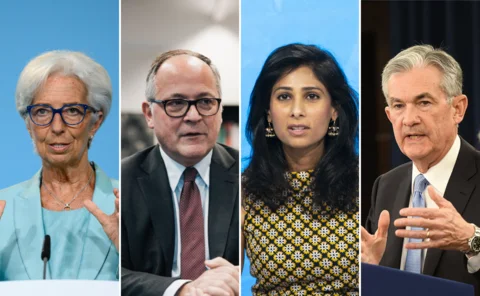Advanced economies
The international effort to manage NBFI risks: where do we stand?
The Covid-19 shock demonstrated more needs to be done to address stability risks posed by the NBFI sector. Maurizio Trapanese details progress made during the Italian G20 presidency as well as outstanding macro-prudential issues
Andrew Bailey acknowledges risk of ‘over-tightening’
Senior economists discuss how to avoid stagflation during a fragile moment for the global economy
PBoC on hold as Fed signals steeper rate rises
Policy-makers face worsening pandemic, rising inflation and tighter global financial conditions
AML supervision at central banks: 2022 survey
Kroll explores why many central banks are investing in skills and data to tackle money laundering, but resourcing constraints are preventing stronger action, as Central Banking’s survey data reveals.
MAS’s Tharman urges investor action on global instability
War, stagflation risk, climate crisis, pandemic and uneven growth create “perfect long storm”
Hong Kong recovery expected to slow – IMF
Fund warns of risks including exposures to Chinese real estate and further supply disruption
Rethinking sovereign risk
‘Risk-free’ assets now include the possibility of complete confiscation with no recourse
US Treasury opposes ending IMF surcharges
Biden administration rejects initiative championed by Democratic progressives
Picking up the pieces: how to tackle the next phase of the Covid crisis
The global economy is heading into dangerous territory, writes Jagjit Chadha. Central banks must honour their commitments to price stability
Minority of central banks define project risk appetite
Institutional risk and delegated risk appetites defined more often
Minority of central banks use GRC platforms
RSA Archer and SAP named as providers
Reputational risk tops central bank concerns
Cyber security and credit/counterparty risk followed
Economics Benchmarks 2021 report – executive summary
Covid-19 coloured central banks’ views on the governance of their economics function in the past year, from research topics to forecasting, data, publications and more
2021: The year in review
The year has seen central banks switch from recovery mode to battling inflation. Central Banking looks back at the stories that made the biggest impact in 2021
Advanced economies draw on wider range of models
DSGE models and newer techniques more common at advanced economy central banks
Quarterly forecast updates predominate
Frequency of forecasts varies more widely in emerging markets
Pandemic spurred use of alternative data
Advanced and emerging market economies prioritise different applications
Unemployment forecast by minority of emerging market economy nations
Data highlights differences based on local economic circumstances
One in five central bank economists have a PhD
Central banks in Africa lag behind peers in sponsoring PhD programmes
Covid-19 causes bigger growth forecast errors
But central banks perform better at forecasting inflation
Policy economists outnumber research economists
Central banks with their own pure research departments tend to employ more policy economists
Economists tend to perform both policy and research duties
Only around a quarter of economics departments have a pure research function
House prices rising at fastest rate since global crisis – BIS stats
Advanced economies see sharpest average increase, but India records largest cumulative rise
ESG reserves adoption challenged by reliance on sovereign bonds
Higher issuance of government-compliant bonds is insufficient to offer investable alternatives to central banks.













